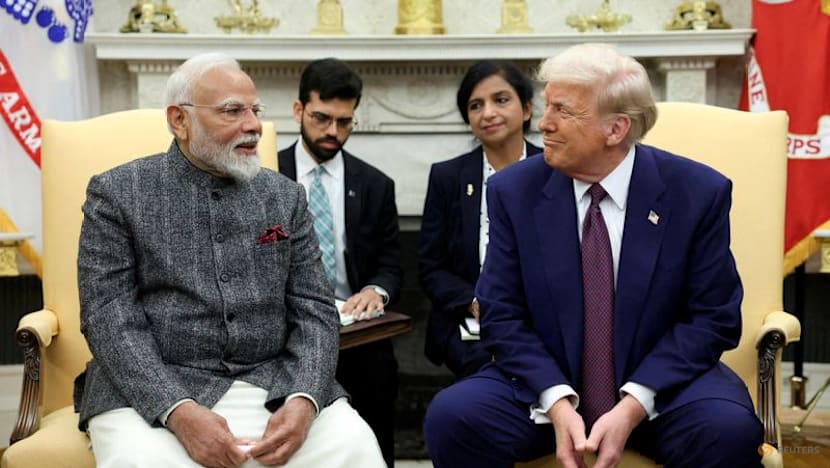Commentary: India is discovering its place with the US
India does not quite have the leverage many presume it has with the United States, says former foreign correspondent Nirmal Ghosh.

File photo of US President Donald Trump and Indian Prime Minister Narendra Modi at the White House in Washington DC on Feb 13, 2025. (Photo: Reuters/Kevin Lamarque)

This audio is generated by an AI tool.
SINGAPORE: After months of heightened tensions over tariffs, negotiators from India and the United States met up this week in New Delhi to discuss a possible trade deal, describing their talks as “positive”.
Even with US President Donald Trump capping things off with a birthday call to Indian Prime Minister Narendra Modi on Wednesday (Sep 17), the broader relationship has grown more cautious.
A key underlying reason for that caution, which has largely been overlooked, is Washington’s reassessment of India’s strategic utility after its brief conflict with Pakistan in May.
In that conflict, when India attacked what it said were terrorist bases in Pakistan - from the air without crossing the border - it got a nasty surprise at first when Pakistan’s integrated China-supplied weapons systems gave the Indian Air Force a bloody nose.
That India adjusted and apparently struck targets in Pakistan effectively has become a moot point. Discounting nuclear parity, India does have military superiority over Pakistan, but it lost the initial narrative - and for the first time Chinese weaponry was shown to be effective in actual combat against other top-of-the-line, mainly French and Russian, jets and weaponry.
It was a reality check for India’s utility to the United States as a “deterrent” to China - a common refrain among analysts in recent years - say by opening up a front to divert and draw resources if China attacks Taiwan and the US has to respond.
In fact, from China’s point of view, it is Beijing that can turn up the heat on India on several fronts - via Pakistan, in the Himalayas, in India’s northeast, and perhaps even via Bangladesh.
India has never sought to play the role of an American proxy. With relations now on shakier ground, such alignment appears even more distant.
This has previously been acknowledged by commentators such as former White House official Ashley Tellis, who has argued that America was making a bad bet on India. In a May 2023 Foreign Affairs article, Dr Tellis, currently among other roles a senior fellow at the Carnegie Endowment for International Peace, cautioned that New Delhi was unlikely to side with Washington against Beijing in the event of a security crisis.
India now faces the writing on the wall - that despite newly rampant nationalism under 11 years of a right-wing government, it does not quite have the leverage many presume it has.
MUSCLING UP
Part of the reason is that it has failed to adequately muscle up either its own domestic economy, or its military capabilities. This has been a disappointment to the United States.
India is left with little choice but to catalyse internal reform to become the economic powerhouse it has always promised to be but never quite attained - as well as build military muscle. Else, despite recent bonhomie with Chinese President Xi Jinping and Russian President Vladimir Putin, it will remain (as is Russia) a junior partner to China in the tentative menage a trois.
This is beginning to be recognised; for instance, a major overhaul to India’s Goods and Services Tax (GST) regime will kick in on Sep 22 to make daily products cheaper and stimulate consumption.
Last week, it was reported that the Indian Air Force is doubling down on its French Rafale jet fighter fleet, proposing to purchase for US$22.65 billion 114 more Rafale fighter jets - taking the total number in service to 176 - with more than 60 per cent of the aircraft’s systems to be made in India.
But there is much more to be done to unleash the real power of an economy that, despite robust growth, is still marked by masses of under- and unemployed and a steady exodus of the best and brightest for opportunities abroad.
Notwithstanding Mr Trump’s more recent mixed signals in which he has reiterated that Mr Modi is his friend, his tariffs and the jibes against India by his economic advisor Peter Navarro and Commerce Secretary Howard Lutnick have reminded India that in the new, Hobbesian global disorder, it is everyone for themselves.
HOMELAND FOCUS?
In a separate but related development, the draft of a new National Defense Strategy reportedly submitted to Pete Hegseth, Secretary of the renamed Department of War, proposes that the US prioritise the security of the homeland.
Analysts have said that this signals a shift in focus from the China and Russia threat that has occupied the American strategic establishment for decades. Such a shift will encounter resistance from the traditionalists of US foreign policy.
In a Sep 7 piece in the New York Times, for instance, Rush Doshi, director of the Council on Foreign Relations’ China Strategy Initiative, and former US deputy secretary of state Kurt Campbell, argued that America alone cannot match China’s scale, but with allies it would be “no contest”.
Both Mr Doshi and Mr Campbell lean hawkish on China. “But if Trump keeps alienating US partners, we'll never get there - and the next century will be China's to lose,” Mr Doshi posted on X.
“As a post-colonial country, attempts to force India always backfire," said Dr Aparna Pande, director of the Initiative on the Future of India and South Asia at the Hudson Institute in Washington DC. "India views itself as an equal, not a junior partner of the US,” she told me.
Whatever problems or strategic convergences India and the US have had in the past, the current American administration’s style of diplomacy makes resolving issues more difficult. And a shift of focus to the homeland, and deprioritising China, would coincidentally support the argument that India needs to look out for itself.
Nirmal Ghosh, a former foreign correspondent, is an author and independent writer based in Singapore. He writes a monthly column for CNA, published every third Friday.




















